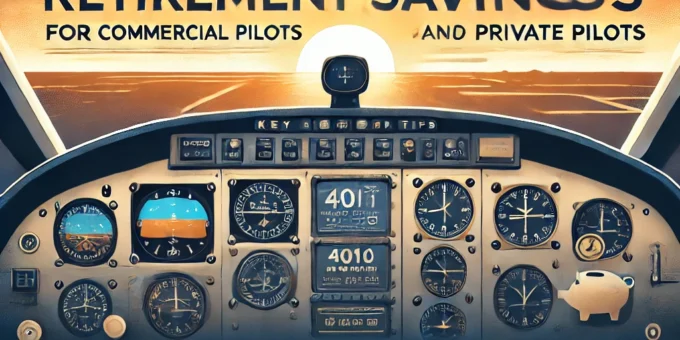
For commercial and private pilots, retirement planning is not as straightforward as in other professions. With fluctuating salaries, long career spans, and specific industry-related risks, pilots must take proactive measures to ensure a comfortable and secure retirement. Whether you’re an airline captain or a private jet pilot, financial preparedness is essential. This article explores the best retirement savings tips tailored for pilots.
Why Pilots Need a Unique Retirement Plan
Unlike traditional 9-to-5 jobs, pilots experience irregular incomes, career disruptions, and sometimes even forced early retirement due to medical reasons. Airline mergers, pension instability, and economic downturns can affect a pilot’s retirement savings, making it essential to have a well-structured financial strategy.
Understanding the Aviation Industry’s Retirement Landscape
Pilots can benefit from employer-sponsored plans such as 401(k)s, pensions, and profit-sharing agreements. However, the availability and quality of these benefits vary by airline, country, and employment type. Private pilots, especially those who are self-employed, must establish their own retirement accounts, such as SEP-IRAs or solo 401(k)s.
Retirement Savings for Commercial Pilots
Most major airlines offer pension plans and 401(k)s with employer contributions, but pilots should aim to maximize these contributions while diversifying their investments. Since airline pensions have been cut in recent years, relying solely on them is risky.
Retirement Savings for Private Pilots
Private pilots who operate on a contract basis often lack employer-sponsored retirement plans. To compensate, they must utilize self-directed accounts such as Roth IRAs, SEP-IRAs, and taxable investment portfolios.
How Much Should Pilots Save for Retirement?
A general rule of thumb is that pilots should aim to replace 70-80% of their pre-retirement income. This amount varies depending on lifestyle choices, location, and healthcare needs.
Maximizing Employer-Sponsored Retirement Plans
For pilots working for major airlines, taking full advantage of company-matching contributions is crucial. The vesting schedule should be considered to ensure that pilots receive the full benefits of their employer’s contributions.
Best Investment Strategies for Pilots
Pilots should adopt a diversified portfolio that includes stocks, bonds, real estate, and alternative investments. Since market volatility can impact retirement savings, balancing high-growth assets with stable income investments is key.
The Role of Annuities and Fixed Income in Pilot Retirement
To provide a stable income stream during retirement, pilots may consider fixed annuities, bonds, and dividend-paying stocks. These ensure a predictable income flow, reducing reliance on market fluctuations.
Managing Taxes on Retirement Savings
Utilizing tax-advantaged accounts such as Roth IRAs and 401(k)s can minimize tax liabilities. Roth conversions and strategic withdrawals can further optimize tax efficiency.
Retirement Planning for Pilots with Irregular Incomes
Due to fluctuating salaries, pilots should establish an emergency fund and use dollar-cost averaging in investments to smooth out market volatility.
Financial Planning for Pilots Nearing Retirement
As pilots approach retirement, shifting investments towards conservative assets, securing long-term care insurance, and optimizing Social Security benefits become critical.
Healthcare Costs and Insurance After Retirement
Pilots must plan for Medicare, supplemental insurance, and long-term care options to avoid unexpected medical expenses.
Avoiding Common Retirement Planning Mistakes
Pilots should avoid delaying savings, overspending in early retirement, and failing to plan for inflation.
Should Pilots Consider Part-Time Work in Retirement?
Many retired pilots engage in flight instruction, consulting, or contract flying to supplement their income.
Frequently Asked Questions (FAQs)
How much should a pilot save for retirement?
Pilots should aim to save at least 15-20% of their income annually.
Can pilots retire early?
Yes, but early retirement requires strong financial planning and alternative income sources.
What happens if a pilot loses medical certification before retirement?
Disability insurance and alternative aviation careers can provide financial stability.
You Can Also Read : Retirement Planning for Pilots: A Complete Financial Guide
Planning for retirement as a pilot requires a strategic, proactive approach. Whether you’re a commercial airline captain or a private pilot, the key is to start early, maximize savings, diversify investments, and plan for unexpected challenges. With careful financial planning, pilots can enjoy a secure and comfortable retirement.
